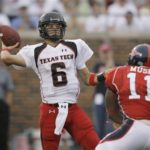
Last fall, before he got fired, Texas Tech football coach Mike Leach banned his Red Raiders from using Twitter after a player tweeted that his coach had been late to a team meeting.
Twitter and Facebook were “stupid” distractions, Leach said, and only narcissists want to “type stuff about themselves all the time.”
Yet, that’s what tens of thousands of college athletes are doing—sending a flood of mostly inane and meaningless chatter that sometimes includes something of interest either to their school or the NCAA. Finding those comments can be overwhelming—but schools now have an app that can do it.
Roughly two dozen athletic departments are using a software program that tracks the Facebook, Twitter, and MySpace pages of athletes for inappropriate posts. When a questionable one pops up, it can alert school officials in a matter of minutes.
“The way we tried to present this to student-athletes [was], ‘We’re not trying to spy on you. It’s not that we don’t trust you. It’s that we care about you,” said Nebraska associate athletic director Keith Zimmer, whose department bought the software after two wrestlers posed for a pornography web site in 2008.
Vermont-based UDiligence [1] sells the program to schools for up to $5,000 per year, billing itself as “reputation management for student-athletes.” But it’s also clear that schools are paying for reputation preservation.
In today’s world, new communication tools are coming so fast that university compliance offices are increasingly overwhelmed as they are asked to check web sites, eMails, and tweets for improprieties. Officially, the NCAA instructs schools to self-report immediately whenever they determine there has been a problem.
Indiana’s compliance office consists of eight full-time employees, one full-time intern, and two to four part-time interns.
“We’ve had to learn new strategies, and we’re always trying to find new strategies,” said Mary Ann Rohleder, Indiana’s associate athletic director for compliance. “I think our compliance office does a good job. But we could probably have people working every single hour of every day and still not catch all of it.”
UDiligence CEO and founder Kevin Long came up with the idea for the software after hearing sports information directors express concerns about the social media activities of their players. Since launching in 2008, Long said, it has been used by Texas Tech, Texas A&M, Louisville, and Ole Miss, among others.
UDiligence has a monitoring application for Facebook that athletes install on their profiles. The software can locate more than 400 inappropriate words—a list Long crafted with help from his old fraternity brothers at Purdue—in status updates and photo and video captions and comments.
The application is designed to look for language that can lead to trouble—incidents like the expletive-filled posting Oregon receiver Jamere Holland put on his Facebook page earlier this year, or the racial slur Texas lineman Buck Burnette had on his Facebook site after Barack Obama was elected president. Holland was kicked off the team and Burnette was dismissed by Texas.
UDiligence only checks public pages on Twitter, at least for now. For MySpace, schools have to set up their own account and have the athletes OK that page.
Long says none of the schools is using the software to track incoming recruits, so far.
“It’s not a gotcha tool. It’s not a disciplinary tool. It’s a mentoring and educational tool,” Long said. “The problem that the schools were seeing was that, ‘Hey, we’re getting some negative publicity about this.’ But in reality, what they’re concerned about is when their athletes go out and graduate and they go into an interview setting where the first thing they might say is ‘Hey, can I see your Facebook page?’”
Schools aren’t infringing freedom of speech rights if the athletes consent to be monitored, says Adam Kissel of the Foundation for Individual Rights in Education [2] (FIRE).
Though Nebraska discontinued the service after one year because school officials believe they can handle things on their own, Zimmer raved about the service. So did Ole Miss assistant athletic director Jamil Northcutt, who recalled seeing “tons” of alerts when the school first started using the software.
That flood slowed to a trickle over time. Northcutt said players, not administrators, will receive the alerts in the future so they can take responsibility for their own social media activities.
“We’re not big brother, but big mother. We’ll get you to just think about it,” Northcutt said. “The more knowledge we can give our kids about this subject, the [better] they’re going to be later on.”
Most schools teach athletes about the risks involved with social media through meetings with coaches and administrators. Many believe that’s enough.
Steve Malchow, an associate athletic director at Iowa State, said the Cyclones talked about using a service such as UDiligence but decided to focus on educating their players, not monitoring them.
“We just have felt like muzzling people’s rights to communicate is not proper. What we can do instead is focus on sharing with them what the consequences are if they act inappropriately,” Malchow said.
At the NCAA, there is more concern about inappropriate contact with recruits. Two years ago, Division I coaches were banned from text-messaging recruits.
NCAA interim president Jim Isch acknowledged in a recent interview with The Associated Press that finding solutions is tricky because of free-speech concerns and the evolving world of communication.
“Who knows what we’re going to be addressing in the future?” Isch said. “I don’t know how we can limit communications given the technology that exists.”